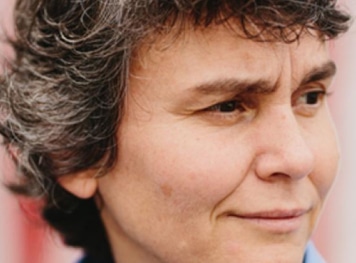
Alex Manning

As a Vermont Law and Graduate School student, Alex Manning was keeping a secret about her past that even her family didn’t know. Years before she came to South Royalton, before her career in law enforcement and drug detection in Georgia, she’d been discharged as a private in the U.S. Army.
She’d never been asked—and never told—about the circumstances surrounding her discharge. In October of 2005, though, Vermont Law and Graduate School sponsored a day-long conference and community-wide conversation on the federal Don’t Ask, Don’t Tell policy concerning gays in the military. Knowing that Manning had once served in the army, organizers of the conference asked her to drive to the Burlington airport, escort, and then introduce one of the speakers for the conference, Col. Grethe Cammermeyer, the highest-ranking officer ever to speak out against the government’s discriminatory policy.
In the car, Col. Cammermeyer said, “I understand you were in the military.”
“Yes, Ma’am,” said Manning.
“And you were discharged.”
“Yes, Ma’am.”
“What did the long form say, Alex?” Cammermeyer asked.
Manning paused.
Then she answered in the coded language that both of them understood all too well. “Failure to adapt to military standards,” she said.
She had never said the reason out loud. She looked straight ahead at the road and began to cry.
At the conference, Manning hesitated, again, during her introduction of the colonel. She made eye contact with a friend among the standing-room audience in Chase Center and looked around at her classmates. She realized in that moment that she felt safer in that community than with anyone else in her life. “I want to share something in public for the first time,” she said. “I was kicked out of the military because I was gay.”
Years later, after she’d become an unapologetic spokesperson for the repeal of Don’t Ask, Don’t Tell, after the policy itself was finally repealed in 2011, Manning recalled the importance of that moment. “It changed the entire conversation that day,” she said. “After that, I could have told them anything. I felt the comfort of being surrounded by 300 siblings. I felt the power of a community supporting me. I made up my mind right then to start speaking out and standing up for what I knew was right.”